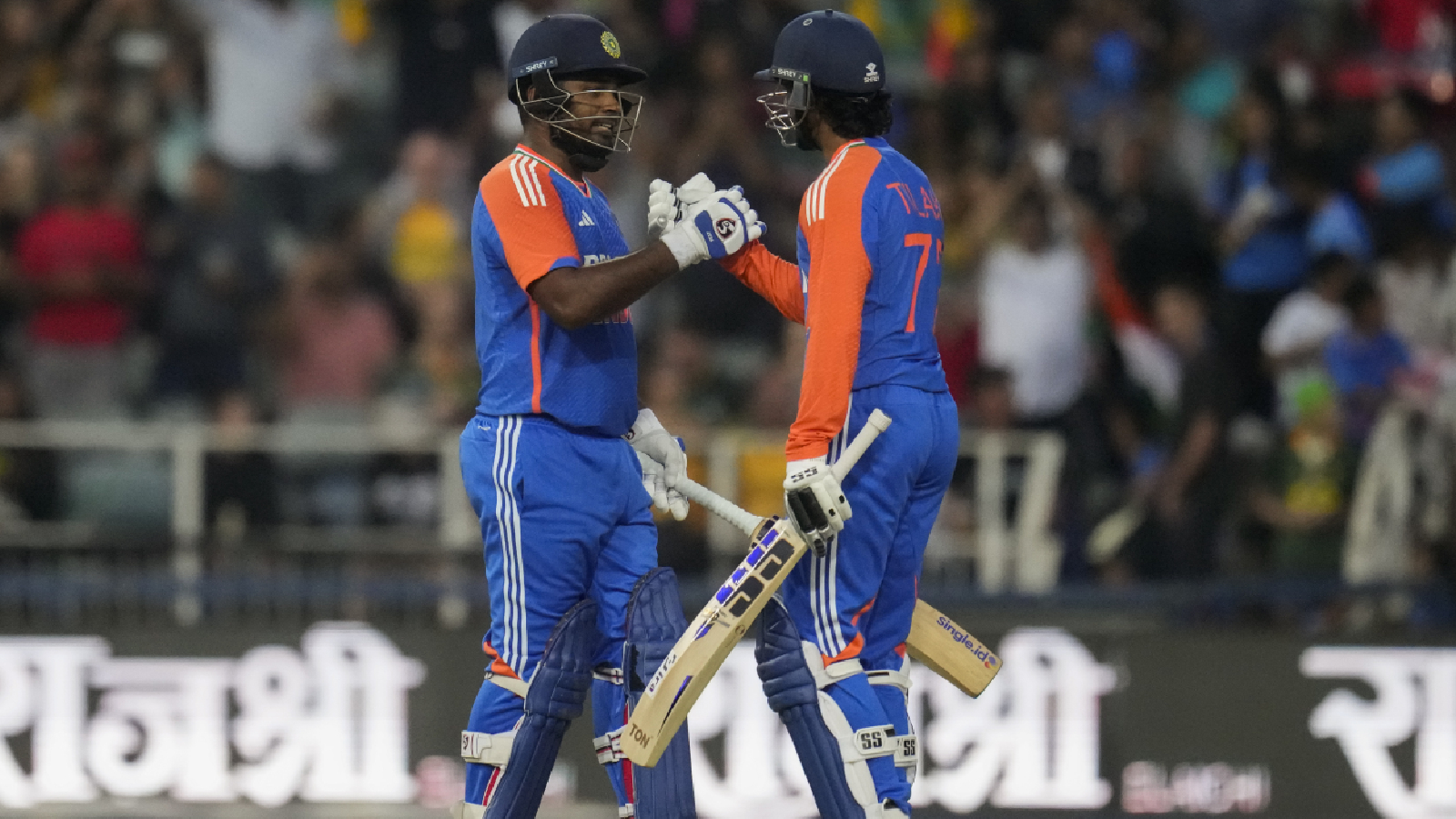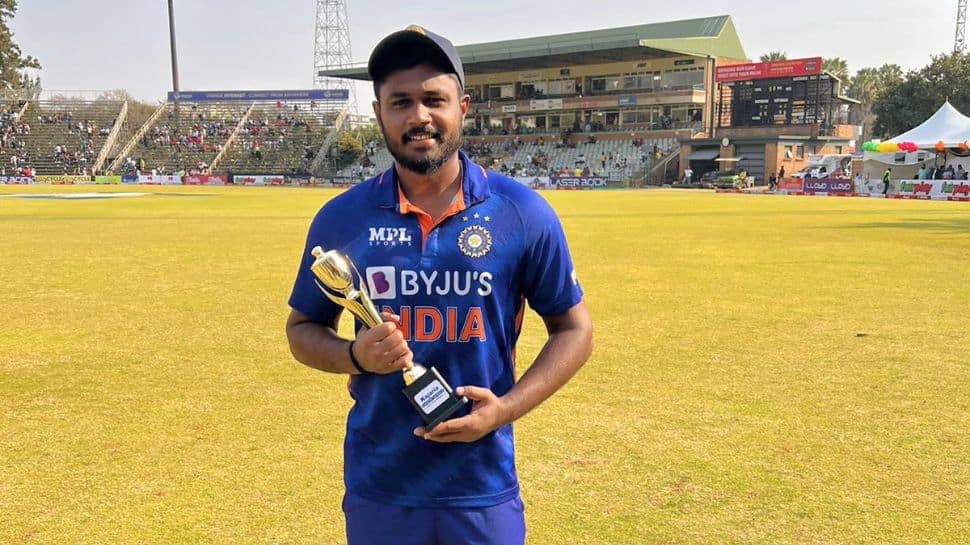In the twilight of Bullring, two Indian batsmen of contrasting styles but a singular devotion to stack as many sixes and fours as possible completed their hundreds. First came Sanju Samson’s milestone, when he bunted a ball through the off-side and celebrated the moment with a flex of his right bicep. Three balls later, Tilak Varma rang his century with a scurried double. His celebrations were more articulate — he sprinted halfway down the ground, struck something of a statue of liberty pose, let out a guttural roar and blew kisses to the dressing room.
Their centuries comprised the spine of India’s hefty total of 283/1, which the hosts fell short by 135 runs. India thus sewed the series 3-1, further illuminating their aura as the T20 World Champions.
It was only the third time two batsmen had struck hundreds in the same game, but that was the least meaningful or spectacular of their statistical embellishments. Their unconquered alliance of 210 was the highest stand for their country. Together with Abhishek Sharma, who reeled out 36 off 18 balls and would have felt regretful in the dressing room for squandering his start, they smote 23 sixes and 17 fours. The rate dropped a trifle when both nudged to their hundreds and when the onset of dusk aided seam movement for the seamers. Still, a six every fifth ball is a brain-twisting feat. The ball simply flew, and for a while as if it may never land. From six-shy, India’s new wave of batsmen has become six-savvy.
The TV show yet again for #TeamIndia 💯
Take a bow, Tilak Varma! 🔥
Catch LIVE action from the 4th #SAvIND T20I on #JioCinema, #Sports18, and #ColorsCineplex! 👈#JioCinemaSports pic.twitter.com/HUbadVPoRc
— JioCinema (@JioCinema) November 15, 2024
Their onslaught, at times, was so absurd that it seemed they were just two graphic robots in a fantasy game. It did not matter how or where they bowled. The batsmen had the knowhow, touch, power and mindset to split the gaps or clear the ropes. They made hitting look so farcical that they did more harm than good to the game as they demystified the art of hitting a six. The pair hit sixes with the ease of tapping a single, or stealing two. Perhaps, this was a sign of the game’s next evolutionary leap.
The methods were different. Sanju, his strokes sounding like the riff of a violin, however violently he was hitting it, was sumptuous in front of the square, a bulk of his fours and sixes coming in the conventional arc between extra cover and mid-wicket (just 14 off his 109 runs arrived behind square). He preserved the finest of them till the fourth ball of the last over. Marco Jansen bowled one back of length tailing into him from around the stumps. Sanju manufactured room by backing away a fraction and slapping him up and over past extra cover. His quick and supple hands stood out, as it had throughout the innings that was a fusion of silk and power.
𝐒𝐚𝐧𝐣𝐮 𝐒𝐚𝐦-𝐓𝐨𝐧 🙌#TeamIndia‘s wonderboy brings up his 3rd T20I 💯of the year!
Catch the 4th #SAvIND T20I LIVE on #JioCinema, #Sports18, and #ColorsCineplex! ⚡🏏#JioCinemaSports #SanjuSamson pic.twitter.com/2bBriab9AA
— JioCinema (@JioCinema) November 15, 2024
As has been his nature in the opener avatar, he pursued boundary shots right from the start, even if his last two innings had yielded zero runs. That’s the brief to all India’s batsmen, bust or blast. It didn’t matter that his initial strokes were edgy. When Gerald Coetzee slightly erred on the shorter side, he uncorked a pick-up pull shot reminiscent of Sachin Tendulkar in his pomp. He didn’t so much shift onto his back-foot as he stood stationary and let his hands swat the ball to the fence.
Little then South Africa knew that this was the first block into the making of a gargantuan innings, an evening left chasing the round white sphere of leather that uncannily avoided even their shadows. Sharma and Sanju consumed only 25 balls for their 50. By the time South Africa ejected Sharma, India had already breezed to 73 in their power-play.
Breeze to hurricane
The breeze soon transformed into a hurricane when Varma hit the boundary-fleecing straps. Willowy and languid, he generates immense power from his crisp bat-swing. Two hits over deep midwicket off Keshav Maharaj strummed his machine to action after a careful start. He combines old-world technical robustness and new-age stroke-play. The masterful left-arm spinner was then thumped over mid-wicket. The moment he realised that the ball was within his reach, he would smack the spinners on one knee.
The only factor that aided him, as well as Sanju, was the injury to Coetzee that forced South Africa to fill in with part-timers. Markram brought himself on — his two overs bled 30 including a 22-run over wherein Varma reverse-slapped him twice for a four and six. Tristan Stubbs’ experiment cost 21 runs in a single over. Medium pacers Lutho Sipamla and Andile Simelane couldn’t stem the deluge of runs with their cutter and slower-ball assortments. The team’s hundred was soon wrapped up in 51 balls.
Tilak on a six-hitting spree 🤯
Catch LIVE action from the 4th #SAvIND T20I on #JioCinema, #Sports18, and #ColorsCineplex! 👈#JioCinemaSports #TilakVarma pic.twitter.com/Zh1MH5bvjO
— JioCinema (@JioCinema) November 15, 2024
If South Africa thought India’s batsmen would relent in the conventional middle overs, they discovered to their horror that Varma and Sanju turned remorseless, almost sadistic. Varma completed his 50 in 22 balls. His next 50 consumed only 21 balls, as he reduced the hosts’ bowlers to props and fielders to onlookers. Under enormous pressure, South Africa creaked. Fielders misfielded, dropped sitters or failed to judge the trajectory of the catches. Even the return of a half-fit Coetzee could not reverse the tide. Varma cuffed his slower ball over long-on. His shots sounded like an axe slicing through a tree, so sharp and definite.
No stopping Samson 🥶
Catch LIVE action from the 4th #SAvIND T20I on #JioCinema, #Sports18, and #ColorsCineplex! 👈#JioCinemaSports #SanjuSamson pic.twitter.com/ctERYkU4u0
— JioCinema (@JioCinema) November 15, 2024
He shuffled around the crease, dishevelling the bowlers’ lengths and threaded the ball through the unusual spaces of the field. In a pleasant antithesis, Sanju was always still after the initial trigger movement. Sometimes he just moved back and waited for the ball. Sometimes, he went back across. Whatever he did, the hips squared off and the forearms came through in a simple, pure swing. Nothing was wasted or excessive.
Soon, in the twilight of Bullring, they completed their hundreds, fully capturing India’s transformation from six-shy to six-savvy group.






